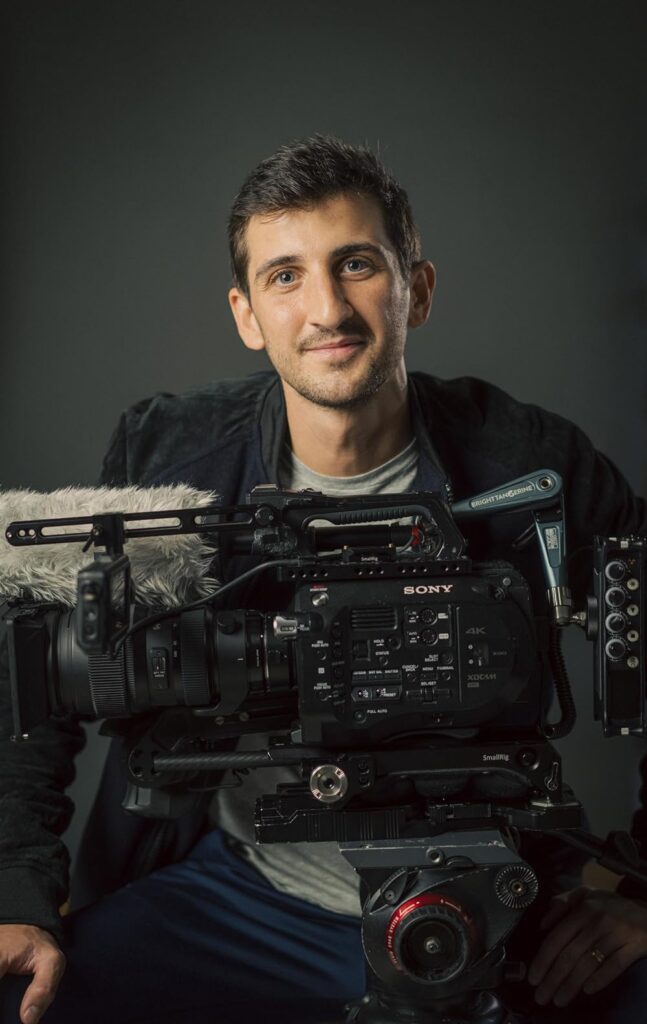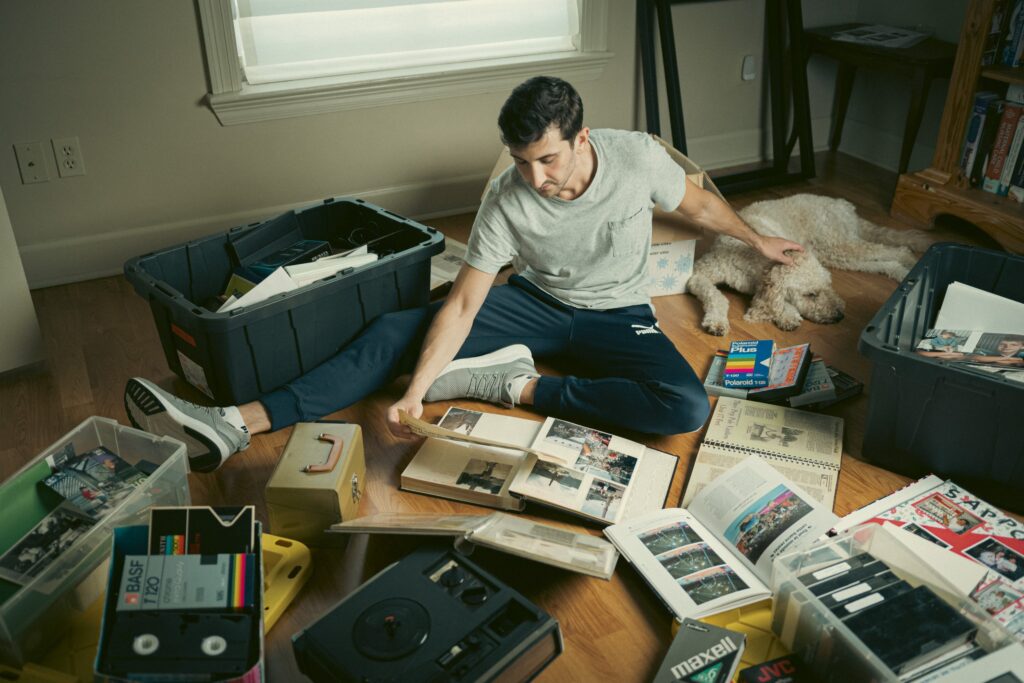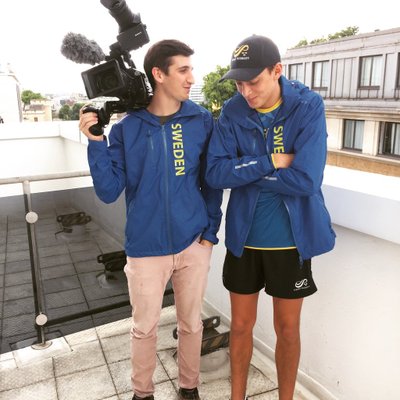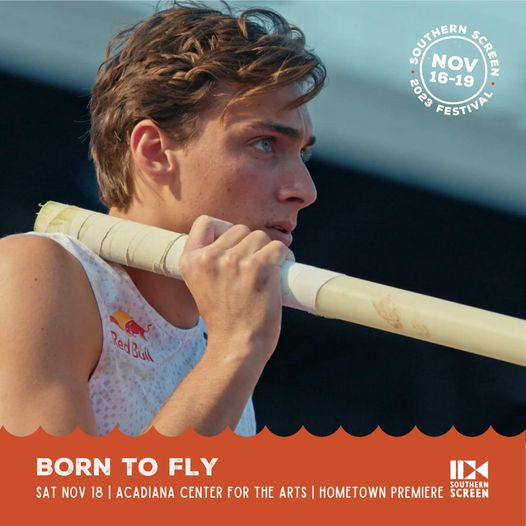Discover Lafayette

Brennan Robideaux – Local Film Director Coming into International Prominence with “Born to Fly”
Lafayette native Brennan Robideaux. recently made big news with the release of his film, Born to Fly, a feature documentary about another Lafayette native, pole vaulter Armand “Mondo” Duplantis.
Born to Fly is a coming-of-age tale about one of the greatest athletes of our generation. Mondo Duplantis is the best pole vaulter in history; he currently holds the world record indoor and outdoor pole vault titles, and won a Gold Medal at the 2020 Summer Olympics.
This story is about love of craft and the determination of Brennan Robideaux, a young filmmaker who risked everything to capture an evolving story. He traveled on his own dime for much of the filming of Born to Fly, was taken under the wing of the Duplantis family as they allowed him to travel with them to Europe to capture their son’s pole vaulting competitions, and only came to acquire financial assistance after several years of filming, directing, and editing the footage that would become an historical documentary, Born to Fly.

Brennan Robideaux says, “I’m very passionate about telling Louisiana stories. My main one I’m working on now is the 1991 gubernatorial election with Edwin Edwards and David Duke. That historical story hasn’t been delved into and my generation, frankly, was born after it. We have no idea about this election. I want to make a film that tells how we got to that point. Louisiana loves emperesque dictators. We love eccentricities in Louisiana.“
Brennan started getting jobs while in high school at STM by filming local athletics. He realized he could make a living in film, and enjoyed taping live events for television. He moved up, becoming a camera operator, filming football games from a perch 40 feet high in the end zone for hours at a time. Brennan loved working with adults while still a youngster and joked that he earned the nickname “Two Cents,” probably due to sharing his opinion on how things should be done a few too many times!
He counts his blessings that by the time he became serious about cinematography, the quality of digital cameras mimicked what you would expect to see from a true film camera. The cost barriers were lower. Traditional film such as used by director Quentin Tarantino are cost-prohibitive for emerging filmmakers operating on a budget.
A short film, “A Riehl Blacksmith,” featuring Sam Riehl, another STM student who was the youngest professional operating as a blacksmith in Louisiana and America, was a breakthrough accomplishment for Brennan. He says, “This short film really taught me how to tell a story in a short period of time.” The short won a few awards: Filmconvert (a New Zealand filmmaker software company) awarded Brennan an honor for filming, editing, and directing, and Soul Pancake, a company founded by Rainn Wilson (of “The Office” fame) licensed the short and put it on its YouTube channel. It was enough to excite Brennan to look at this avocation as a career. And, he was only a Senior in high school.
Brennan was invited to attend NFFTY (National Film Festival for Talented Youth) in Seattle due to the success of A Riehl Blacksmith. While he wasn’t able to attend, it was the only film festival he made it into until Born To Fly.
https://www.youtube.com/watch?v=CNzKXBiYcV8
Brennan attended UNO for a short time but dropped out to pursue his passion of filmmaking. By the time he was 21, he was back in Lafayette living with his parents and looking for a project to energize him once more.
That motivational project came to life in 2017 after Brennan read a story in the Daily Advertiser about a Lafayette High student named Mondo Duplantis, the world junior record holder in pole vaulting. Brennan was familiar with the Duplantis family as the parents were both incredible athletes (Greg Duplantis was one of the best pole vaulters of his time and Helena represented Sweden in the heptathlon at international championships), and both participated at LSU in track and field events at the same time as Brennan’s own parents, Joel and Bobette Robideaux.
Brennan got Greg Duplantis’s number from his dad and called to get permission to film Mondo as he practiced and competed in events. Greg said he needed to talk to Mondo himself to see what he thought, and Brennan sent a very long, “novella-length” text with a message basically saying, “It would be good to capture this for history.” In typical teen talk, Mondo replied, “I mean, sure, I guess.”
Brennan’s family lived across the street from Lafayette High, so he would walk over every day after school to document Mondo’s training. But things developed real fast as Mondo was set to compete in the Senior Men’s World Championship as a 17-year old. Three months into filming, Brennan took his first trip to Europe.

Brennan had never been to Europe, but that is where he was headed as major track and field events are almost exclusively conducted overseas. (The sole facility in the U. S. of any importance is located at the University of Oregan’s Hayward Field in Eugene, OR, known as TrackTown USA, the place of the U. S. Olympic Team Trials.)
“Mondo came in 7th in that competition, but the fact that he made the finals was incredible. The heights he jumped in high school were good enough for him to win, but you have to deliver on that day. It doesn’t matter that you’re a prodigy.”

“It was undeniable that I never met anyone like Mondo. He was so serious. There was nothing else that mattered other than pole vaulting. Pole vaulting was everything to him and had always been everything to him.”
The Duplantis family took Brennan in as the filming continued, and allowed him to stay with them as they traveled with Mondo to European competitions. Brennan lived on peanut butter, slept on the floor, or took the couch or chair if that was available. Helena Duplantis’ family had a place in Sweden they would let Brennan stay during the summers. “The Duplantis family gave me every resource possible. And, they never said, ‘Turn off the camera’.”
Track and field events (as well as other sports) do not allow recording of the action for commercial purposes, unless you have a license from the appropriate sports league. So Brennan had to tell the story of what happened around the competitions, the leadup to the event, and the aftermath. Brennan caught the action that happened on the bus or in the hotel room before the events. And then had to pay hefty license fees to gain access to the film that depicted Mondo winning competitions.
Brennan looks back on the years-long filming of what became Born to Fly and sums it up, “It was a coming of age story that simultaneously documented this incredible athlete. How he became this world-renowned, greatest athlete in the world, while also growing up. These were his most formative years. There were so many mental hurdles he had to grow through. Mondo competes against himself. While pole vaulting is very competitive, when you’re out there, it’s just you. Mondo had a bunch of ups and downs, and I heard a well-known track and field star say, ‘The road to greatness is littered with the bodies of prodigies. But Mondo had a “Rocky” story. In the film you get to see how he handled intense competition.”
https://www.youtube.com/watch?v=7Y2dcdGsLNg
In 2020, Mondo broke the world record in pole vaulting. Then Mondo won the Gold in the 2020 Olympics. Brennan thought that equity investments in the film would come in at that point, but that did not happen. He then turned to Kickstarter to raise $100,000 but came up way short, raising about $30,000 from local sources. A producer counseled him that accepting the Kickstarter money was a no-win for independent filmmakers and could make his life more difficult down the line, so he canceled Kickstarter and returned all the money.
Brennan eventually sold the film as a presale to Sveriges Television (“SVT”), Sweden’s #1 broadcast platform and national public television broadcaster, to assist in costs to complete the project. He had been working making commercials and also for DoorDash to make some cash, and his wife was working double shifts at the hospital to keep them afloat. With SVT’s support, he was able to bring on an editor and producer in Sweden, as well as a U. S. producer and entertainment attorney Bill Ramsey in New Orleans for guidance. He got to work with a music composer for the first time.
Brennan had filmed over 500 hours of video, and had to edit down the final cut to 90 minutes. “I don’t like watcing my films,” says Brennan. “I know a lot of incredible moments that didn’t make it.” Editing took two years. Brennan spent time going back and forth to Sweden to get the film ready and brought on Red Bull Studios as the production partner.

Born to Fly will be out in the U. S. before the Summer Olympics this year. It is available to watch in Europe and selling well. Attendees of Lafayette’s Southern Screen Film Festival as well as patrons of the Manship Theatre in Baton Rouge were privileged to watch local screenings of Born to Fly in the past few months.
Discover Lafayette would like to congratulate Brennan Robideaux for his love of craft and sheer determination to see this important documentary through to the finish. We look forward to watching Born to Fly as well as watching Brennan’s career soar!






 Visit Podcast Website
Visit Podcast Website RSS Podcast Feed
RSS Podcast Feed Subscribe
Subscribe
 Add to MyCast
Add to MyCast